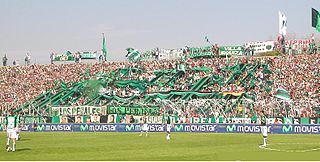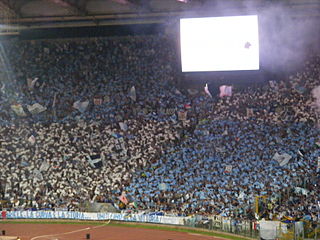
Associazione Sportiva Roma is a professional football club based in Rome, Italy. Founded by a merger in 1927, Roma has participated in the top tier of Italian football for all of its existence, except for the 1951–52 season. Roma has won Serie A three times, in 1941–42, 1982–83 and 2000–01, as well as nine Coppa Italia titles and two Supercoppa Italiana titles. In European competitions, Roma won the Inter-Cities Fairs Cup in 1960–61 and the UEFA Conference League in 2021–22, while they finished runners-up in the 1983–84 European Cup, the 1990–91 UEFA Cup and the 2022–23 UEFA Europa League.
The Heysel Stadium disaster was a crowd disaster that occurred on 29 May 1985 when Juventus fans were escaping from an attack by Liverpool fans while they were pressed against a wall in the Heysel Stadium in Brussels, Belgium, before the start of the 1985 European Cup final. The stadium was poorly maintained and in desperate need of repair and had failed inspections prior to the disaster, and the wall collapsed under the force. Thirty-nine people—mostly Italians and Juventus fans—were killed and 600 were injured in the confrontation.

A football chant or terrace chant is a form of vocalisation performed by supporters of association football, typically during football matches. Football chanting is an expression of collective identity, most often used by fans to express their pride in the team they support, or to encourage them, and to celebrate a particular player or manager. Fans may also use football chants to slight the opposition, and many fans sing songs about their club rivals, even when they are not playing them. Sometimes the chants are spontaneous reactions to events on the pitch.

Millwall Football Club is a professional football club in Bermondsey, South East London, England. They compete in the EFL Championship, the second level of English football. Founded as Millwall Rovers in 1885, the club has retained its name despite having last played in the Millwall area of the Isle of Dogs in 1910. From then until 1993, the club played at what is now called The Old Den in New Cross, before moving to its current home stadium nearby, called The Den. The traditional club crest is a rampant lion, referred to in the team's nickname The Lions. Millwall's traditional kit consists of dark blue shirts, white shorts, and blue socks.

Ultras are a type of association football fans who are known for their fanatical support. The term originated in Italy, but is used worldwide to describe predominantly organised fans of association football teams. The behavioural tendency of ultras groups includes singing football chants, playing musical instruments such as drums, their use of flares and smoke bombs, frequent use of elaborate displays, vocal support in large groups and the displaying of flags and banners at football stadiums, all of which are designed to create an atmosphere which encourages their own team and intimidates the opposing players and their supporters. These groups also commonly organise trips to attend away games.

Football hooliganism, also known as soccer hooliganism, football rioting or soccer rioting, constitutes violence and other destructive behaviors perpetrated by spectators at association football events. Football hooliganism typically involves conflict between pseudo-tribes, formed to intimidate and attack supporters of other teams. Certain clubs have long-standing rivalries with other clubs and hooliganism associated with matches between them can be more severe. An example of this is the Devon Derby . Conflict may arise at any point, before, during or after matches and occasionally outside of game situations. Participants often select locations away from stadiums to avoid arrest by the police, but conflict can also erupt spontaneously inside the stadium or in the surrounding streets. In extreme cases, hooligans, police and bystanders have been killed, and riot police have intervened. Hooligan-led violence has been called "aggro" and "bovver".

Barra brava is the name of organized supporters' groups of football teams in Argentina, analogous to European ultras and British hooligans in providing fanatical support to their clubs in stadiums and provoking violence against rival fans as well as against the police.
The Millwall Bushwackers are a football firm associated with Millwall Football Club. Millwall have a historic association with football hooliganism, which came to prevalence in the 1970s and 1980s, with a firm known originally as F-Troop, eventually becoming more widely known as the Millwall Bushwackers, who were one of the most notorious hooligan gangs in England. On five occasions The Den was closed by the Football Association and the club has received numerous fines for crowd disorder. Millwall's hooligans are regarded by their rivals as amongst the stiffest competition, with Manchester United hooligan Colin Blaney describing them as being amongst the top four firms in his autobiography 'Undesirables', and West Ham hooligan Cass Pennant featuring them on his Top Boys TV YouTube channel, on which their fearsome reputation for violence was described.

On 2 February 2007, football violence occurred between football supporters and the police in Catania, Sicily, Italy. The clashes occurred during and after the Serie A match between the Catania and Palermo football clubs, also known as the Sicilian derby. Police officer Filippo Raciti was killed; in response Italian football was suspended for about a week.
The MIGs are a football hooligan "firm" associated with the English football club Luton Town, which was originally formed in the 1980s.

Het Legioen is the name of the supporters and fans of Dutch football club Feyenoord Rotterdam.
"No one likes us, we don't care" is a sports chant that originated as a football chant sung by supporters of the English football club Millwall in the late 1970s. It is sung to the tune of "(We Are) Sailing" by Rod Stewart.

The S.S. Lazio fans are supporters of Italian football club Lazio.

The 1985 Luton riot occurred before, during and after a 1984–85 FA Cup sixth-round football match between Luton Town and Millwall on 13 March 1985 at Luton Town's Kenilworth Road ground in Luton, Bedfordshire, England. It was one of the worst incidents of football hooliganism during the 1980s, and led to a ban on away supporters by Luton Town which lasted for four seasons. This itself led to Luton's expulsion from the Football League Cup during the 1986–87 season. The club also began to enforce a membership card scheme, which Margaret Thatcher's government attempted to have adopted at grounds across England. Kenilworth Road was damaged, along with the surrounding area, and a year later was converted to an all-seater stadium.

The 2009 Upton Park riot occurred in and around West Ham United's Boleyn Ground, in Upton Park before, during and after a Football League Cup second round match between West Ham and Millwall on 25 August 2009. The match was won by the home side 3–1 after extra time, but the game was marred by pitch invasions and disorder in the streets outside the ground, where a Millwall supporter was stabbed. The disturbances were met with condemnation by the Football Association, the British government and the two clubs involved. The incident led to fears of a return of the hooliganism that had tarnished the reputation of English football in the 1970s and 80s. There were also concerns that it could have a negative effect on England's bid to host the 2018 World Cup - which was rejected in favour of the bid from Russia more than a year later.

A supporters' group or supporters' club is an independent fan club or campaign group in sport, mostly association football.
The 1988 Football League Second Division play-off final was an association football match contested between Chelsea and Middlesbrough over two legs on 25 May 1988 and 28 May 1988. It was to determine which club would play the next season in the First Division, the top tier of English football. Chelsea had finished the season fourth from bottom in the First Division, while Middlesbrough were third in the Second Division. They were joined in the play-offs by the teams that had finished fourth and fifth in the Second Division: Chelsea defeated Blackburn Rovers in their play-off semi-final, while Middlesbrough beat Bradford City.

Beginning in at least the 1960s, the United Kingdom gained a reputation worldwide for football hooliganism; the phenomenon was often dubbed the British or English Disease. However, since the 1980s and well into the 1990s the UK government has led a widescale crackdown on football related violence. While football hooliganism has been a growing concern in some continental European countries in recent years, British football fans now tend to have a better reputation abroad. Although reports of British football hooliganism still surface, the instances now tend to occur at pre-arranged locations rather than at the matches themselves.

The UEFA Euro 2016 football championships in France saw several recorded instances of football hooliganism and related violence between fans, both at the venues where matches took place, and in cities near the participating stadiums. The violence started immediately before the tournament began, and involved clashes between several countries. Some of the rioting came from established gangs and football hooligan organisations, which deliberately intended to provoke violence. They clashed with riot police who controlled the crowds using tear gas and a water cannon.

Paris Saint-Germain Football Club (PSG) is the most popular football club in France and one of the most widely supported teams in the world. Famous PSG fans include Nicolas Sarkozy, Tony Parker, Fabio Quartararo, Patrick Dempsey, Victoria Azarenka, Teddy Riner, DJ Snake, Michael Jordan, Kevin Durant, Victor Wembanyama and Luka Bošnjaković.












